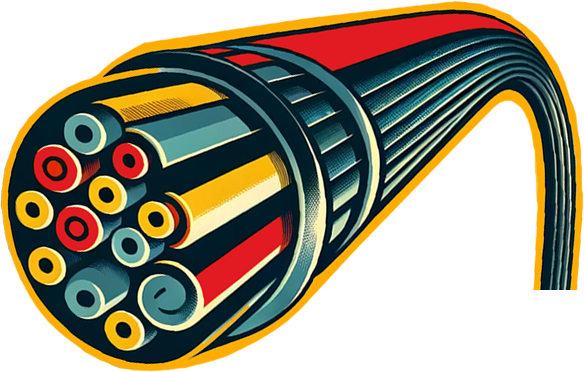Aluminum wiring can be safe if it’s installed and kept up well. But if not, it can cause loose connections and overheating. It’s important to get a pro to check it out and think about options like pigtailing or using CO/ALR-rated devices to help prevent any risks.
Aluminum Wiring in Homes
Ever wondered why older homes have aluminum wiring?
In the 1960s and ’70s, copper was pricey, so builders used aluminum instead.
Many older homes in this area still have this type of wiring hidden in the walls.
While it was cheaper at the time, the devices back then weren’t always a good match for aluminum.
But today, aluminum is still used for its light weight and low cost, especially for power lines and some home wiring.
It works well for service feeders and electrical services now.
Since aluminum wiring is common in older homes, it needs special care.
It’s important to ensure it’s compatible with modern devices.
The Local Electrician in Richmond, TX, can help with this type of wiring.
They offer expert advice and solutions for any issues.
Whether you want to learn about its history or manage its inspection and maintenance, it’s essential to understand aluminum wiring for a safe and efficient home.
Aluminum Wiring: What You Need to Know
In the ’60s and ’70s, aluminum wiring was popular because copper prices were high.
It was a cheaper choice for home electrical systems.
Today, you mostly find it in power lines and local power setups.
You might be surprised, but aluminum is still used in many service feeders and new home electrical designs.
Its uses have evolved.
Over time, people began to worry about this type of wiring.
Homes using it can be at a higher risk of electrical issues compared to those with copper.
It sounds concerning, but remember, systems before the mid-’70s weren’t designed well for aluminum, which led to problems.
Copper is still the go-to for home wiring since it’s more flexible and a better conductor.
But now, thanks to better materials and safety standards, aluminum can be safe in the right situations.
Knowing this can help you make smart choices about home safety and electrical upkeep in Richmond, TX.
Why Aluminum Wiring Can Be a Concern
Aluminum wiring can present risks, especially in older homes in areas like Richmond, TX.
This type of wiring expands and contracts more than copper, which can make connections loose over time.
Loose connections can overheat and, in bad cases, cause fires.
This material also oxidizes more, forming a layer that raises resistance and heat at joints, upping the fire risk.
Bad installations are common too.
Using steel screws with this wiring can cause problems because the two materials expand differently with heat.
Signs of trouble include warm outlets, flickering lights, and a burning smell, especially when using appliances.
Hiring a pro like The Local Electrician can find and fix these issues.
It’s important to focus on safety to keep your home safe and trouble-free.
With this type of wiring, it’s not just about upkeep—it’s about keeping your home and peace of mind protected.
Signs of Aluminum Wiring Issues
Spotting problems with aluminum wiring early can save homeowners in Richmond, TX from serious electrical risks.
One big sign is overheating.
You might notice outlets or switches that feel warm to the touch, which could signal upcoming trouble.
Keep an eye out for any burning smells from electrical devices, as this means there may be too much heat from bad connections.
If your circuit breaker trips a lot or fuses blow often, it’s a sign something’s wrong and needs fixing right away.
Look for visual clues of wear and tear, too.
Discolored or scorched outlets can mean there have been past overheating issues.
Flickering lights might not seem like a big deal, but they can indicate trouble with wire connections or loose terminals.
These symptoms often come from the limits of aluminum wiring, especially when paired with incompatible materials like steel screws.
Loose connections can create high-resistance points that cause more heat to build up.
If you notice these signs, it’s wise to contact The Local Electrician.
Recognizing these warning indicators helps you stay ahead in keeping your home safe.
Always choose to have a professional check things out to handle these risks correctly.
How Aluminum Wiring and Copper Wiring are Different

Aluminum and copper wires work the same way, but they have key differences in how they act and what they’re made of, which affects their use and safety in homes.
Aluminum is lighter than copper, so it’s often used for certain things like service lines.
But, it does have some challenges.
First, Aluminum Wiring expands more with heat compared to copper.
This is important when it comes to connections.
Over time, this expanding and shrinking—sometimes called “creep”—can make connections loose, especially if steel screws are used.
Copper doesn’t expand as much, which makes it more reliable in small spaces.
Another difference is how they handle oxidation.
Copper forms a stable layer when it oxidizes, but aluminum’s oxide layer can block electrical flow, which can increase resistance and lead to overheating.
Homeowners in Richmond should be aware of these differences.
Regular checks by pros like The Local Electrician in Richmond, TX can help keep things safe.
Understanding how Aluminum Wiring and copper wiring are different is important for those who want to make smart choices about their home’s wiring.
Problems Associated with Aluminum Wiring
Aluminum wiring can cause a few problems that homeowners should know about.
One big issue is bad installations.
Back in the 1960s to the mid-1970s, not all electrical systems were ready for the special needs of this type of wiring.
Often, people used the wrong connections, like steel screws, which can loosen over time because aluminum expands and contracts differently.
This can lead to overheating and pose safety risks.
Another issue is oxidation.
When aluminum meets air, it forms an oxide layer that doesn’t conduct electricity well.
This can raise resistance at connections, causing more heat, which might lead to loose wires or even electrical fires.
Even though aluminum is still used today for its cost and weight benefits, these old problems need careful attention.
These issues show why professional electrical checks are so important.
Certified electricians, like those at The Local Electrician in Richmond, TX, can make sure aluminum wiring is inspected and maintained right, keeping your home safe from electrical risks.
Regular checks are key to fixing these problems and keeping your home secure.
Why You Need a Pro for Electrical Inspections
To keep your home safe, nothing beats a pro electrical inspection.
Inspectors don’t just spot obvious problems; they use special tools to check your homes’ wiring.
They look for signs of overheating, loose connections, and bad installs—issues often caused by heat expansion and rust.
These checks are key, especially in older homes with Aluminum Wiring.
Regular inspections help spot and fix small issues before they become big ones.
They ensure everything is in good shape and works well with aluminum materials.
Skipping these checks could lead to big risks like electrical fires.
So, it’s not just about plugging in devices—it’s about keeping your home’s safety strong.
Getting your wiring checked by a pro gives you peace of mind.
They catch problems before they get worse.
Reach out to The Local Electrician in Richmond, TX for your inspection needs.
Their know-how with Aluminum Wiring means they can offer advice and solutions to keep your home safe and sound.
Addressing Aluminum Wiring Problems
Got aluminum wiring in your home?
You’re not alone.
Managing this type of wiring requires careful attention.
One comprehensive solution is to rewire the whole home.
This process involves replacing old wiring with solid copper, celebrated for its excellent conductivity and fewer issues, though it can be costlier and somewhat disruptive.
If a full rewiring project isn’t feasible, consider enhancing your current system.
Qualified electricians can install specialized connectors and devices designed specifically for aluminum-based wiring to minimize risks.
Using certified connectors and switches can mitigate common issues such as loose connections, which often lead to electrical problems.
Remember, professional assessments are essential in determining the best approach for your unique situation.
Consulting with experts like The Local Electrician in Richmond, TX can provide you with tailored guidance emphasizing safety and effectiveness.
Every home is different, so choosing the right solution will enhance security for you and your family.
Regular check-ups and selecting the appropriate components help in maintaining a safe electrical system.
Ensuring Aluminum Wiring Safety
Ensuring the safety of aluminum electrical wiring, especially in older Richmond, TX homes, is essential for homeowners.
“The Local Electrician” offers expert help to tackle these issues.
One way to reduce risks is to use approved equipment and materials made for this type of wiring.
This includes devices rated CO/ALR, which are designed to safely handle aluminum conductors.
Regular checks by pros like those at “The Local Electrician” are essential.
These checks find problems before they turn serious, helping you feel safe and making sure you meet current safety rules.
During these checks, electricians look for signs of overheating and loose connections, which are common causes of electrical fires in homes with these wires.
Another effective approach is using approved systems for safer connections, such as methods that involve connecting compatible materials.
This helps balance how the two metals conduct heat and expand.
Using the right connections stops too much oxidation, a known issue with aluminum, and helps reduce fire risks.
In short, addressing aluminum electrical wiring issues with certified professionals provides Richmond, TX homeowners with a safer, more reliable electrical system.
How to Make Your Wiring Safer
Using Copper Pigtails is a recommended way to enhance the safety of this type of wiring.
By adding short pieces of copper wire to specific connections, you can lower the risk of resistance and overheating.
This helps manage the expansion of materials, which can cause connections to become loose over time.
Securing Connections is equally important.
Many issues with aluminum home wiring stem from improper installation, particularly in older Richmond, TX homes.
To address these issues, ensure that connections are secure and use materials like anti-oxidant compounds designed for use with these wires.
The Local Electrician can assist in thoroughly checking and tightening these connections to maintain safety.
For long-term safety, use only devices rated for use with this wiring, such as CO/ALR-rated devices.
These are specifically designed to provide better performance and reduced risks.
Regular check-ups by professional electricians are crucial.
The Local Electrician is well-versed in handling aluminum wiring and can help you avoid problems, ensuring your home’s electrical system remains safe.
If you’re in Richmond, TX, it’s wise to seek professional assistance to keep your wiring secure.
When to Think About a Full Upgrade
Upgrading from aluminum electrical wiring is like choosing between an old car with constant breakdowns and a new, dependable one.
Reliability and safety should be your main thoughts when deciding if you need a full upgrade.
If you often deal with flickering lights, warm switch plates, or a burning plastic smell, it’s time to look at your wiring.
Old electrical systems with aluminum can come loose over time and bring more risks.
Upgrading gives you peace of mind, especially in older homes where this type of wiring was common.
With fewer fire risks and better electric efficiency, upgrading is often smart.
In the end, talking to The Local Electrician in Richmond, TX, can help you decide if you need a small fix or a full rewire.
They make sure the upgrade meets today’s safety rules for a safer, more efficient home.
With their skill in checking such wiring, they help homeowners make informed, wise choices.
Selecting Devices for Electrical Systems with Aluminum Wiring
Choosing the right devices for these systems is key to staying safe.
CO/ALR rated devices are a reliable choice.
They are made to handle how aluminum expands and shrinks, cutting down the risk of loose plugs and dangers.
Switching to safer choices is also smart.
For outlets, switches, or lights, use ones that are certified for these systems.
This means they work well and last, helping to avoid problems like rust and overheating.
It’s also really important to use the right installation methods.
Connectors that meet standards will ensure a strong link between aluminum and copper, when needed.
The Local Electrician in Richmond, TX emphasizes the importance of professional assessments and upgrades to keep your electrical system safe.
By choosing the right devices and getting expert help, like from the Local Electrician, you can keep your home’s wiring safe and working well.
Importance of Professional Electrical Connections
Handling connections between aluminum electrical wiring and copper wires is not a task to be taken lightly.
If done wrong, it might cause overheating and even fires.
One safe way is to use special connectors made specifically for these types of connections.
These connectors help mitigate risks by accounting for the different expansion and contraction rates of the two metals, preventing loose connections over time, particularly in aluminum-based wiring.
When you connect these two types of wires, use connectors marked with the appropriate indications.
These are crucial to keep a tight fit and won’t break down due to the wire’s different properties.
Proper connections are essential for aluminum wiring since avoiding standard twist-on wire nuts is important; they’re not made for this type of job and might fail under heat.
Another method is “pigtailing.”
You connect a short copper wire to the aluminum electrical wiring using a special connector, then link the copper conductor to other devices.
This helps avoid direct contact between the aluminum and copper, reducing corrosion and increasing longevity.
However, this process requires skill and care, so it’s always best to call a professional electrician like The Local Electrician in Richmond, TX, to handle these tasks.
This way, you can be sure your home’s aluminum electrical wiring and overall electrical system are safe and up to standard.
FAQs

What is “pigtailing” with copper wire?
Pigtailing is when you connect copper wire to aluminum conductors using special connectors. This lowers the risk of wires overheating by ensuring the connection is solid.
Is aluminum wiring safe if professionally maintained?
Yes, if these types of electrical systems are set up correctly and inspected regularly, they can be safe. Professionals ensure connections are secure and use compatible devices to minimize risks.
Why is aluminum wiring still used today?
This type of wiring costs less and weighs less than copper, making it suitable for specific applications like power lines and feeder services. Modern systems address previous safety concerns, making it a reliable choice when used correctly.
What are common signs of aluminum wiring issues?
Look out for flickering lights, outlets or switches that feel warm, and unusual smells near electrical fixtures. These may indicate wiring problems.
How often should aluminum wiring be inspected?
Have it inspected every 3-5 years to ensure all connections are secure and safe. This helps identify and address any wear and tear early on.




























